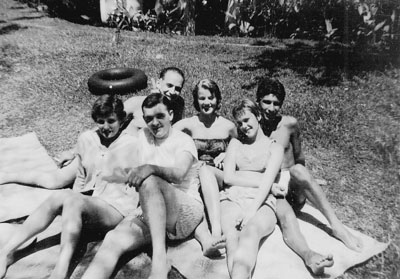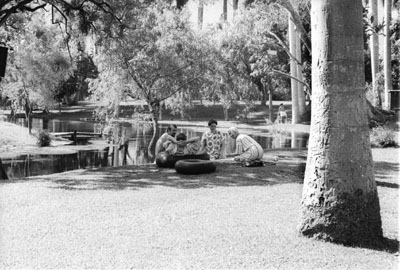|
It was my
father's story: Mexico's romance and intrigue, youthful revelry amidst
bougainvillea, tequila, mariachi bands, pyramids and family lore. His
father: an expatriate nestled into the slopes of mountains south of
Mexico City. His absent father. His absent father's other life: a new,
brilliant, exotic other wife and her children from a previous relationship.
And their one new child together: Jenny, my dad's half sister, a model,
a stranger, a new friend.
In the mountains south of Cuernavaca, where they all lived, is a river
- a spring, actually, born from deep in the Sierra de Tlaltizapan, the
place where Emelio Zapata made his southern headquarters for a revolution.
This magical spring-fed river, flowing beneath royal palms and banana
trees, is Jenny's favorite place on earth.
Over the years, my father's story was understood to be a sore point
in our family, not something we talked about over dinner, or ever, really.
"Those people were horrible." That's what my mother would say. "What
kind of man abandons his three-year-old son, sends him and his wife
off to New York City, says he'll follow and then never does? Instead,
he runs off with his boss's wife and moves to Mexico..."
It wasn't a
family secret. It was a family shame. They never talked to any of "those
people" again. My grandmother never remarried, although she kept her
husband's picture framed and on the hutch with her good dishes.
My absent
father preferred to spend his nights in Northern New Jersey go-go joints,
playing pool. He was a salesman. In one of maybe two letters he ever
wrote me in college, he said he never wanted to be a Willy Loman. Now
I watch the "Sopranos" and see him in there, the Bada Bing, avoiding
coming home where his choices lived.
When he was 19 or 20, my father
went to Mexico. His father's new family took him in, lavished him with
love, took him to a spring-fed river near Tlaltizapan in the state of
Morelos, 37 kilometers away from their house built from volcanoes. Part
of the family lore was that my grandfather would pack up the car with
his wife and kids and dogs and birds and take them all to Las Estacas.
After they'd all leap from the 12-foot-high platform into the 25-foot
deep posa azul, where the spring is freed from the mountain at the pace
of 8,000 liters per second, they'd float the one-kilometer-long river
all day long in inner tubes or just swim under the amates, long-lived
Mexican fig trees sprinkled with cooing birds. Long picnics on the grass
followed, tortas and hibiscus iced tea.
My father never mentioned Las
Estacas. But there was that one photograph, in bathing suits with smiles,
kept with the others of those people that were not displayed in our
house. They were in a box in the garage, and when we got old enough
to ask questions, he would simply say, "Oh, that's Jenny (you'd love
her)."
The actual stories of what went on during his three months in
Mexico went unspoken. All he'd say was that he partied, drank, hung
out, had fun but had to choose. He had just met my mother before he
left Brooklyn: Stay in Mexico or go home to his girlfriend... They got
married a few years later. It was 1959. His father didn't come to the
wedding.
In that one photo, my boyish father is laying on a large blanket
spread on the grass. He's wearing a bathing suit and white T-shirt.
He's leaning slightly into a woman, a brunette laying on the blanket
next to him, his arm evidently positioned behind him (her) to prop himself
up. An inner tube is just off to the left on the grass, behind the group
of six. Jenny is there, looking maybe 16 - leaning playfully into the
chest of a young, dark-complexioned handsome, thin boy.
I was 26 before
I knew Jenny existed outside of these yellowing, storyless photos. My
dad had died and none of "those people" knew. We should tell them, my
sister and I thought. Not really knowing where to begin, we called information
in Mexico."Dowling in Cuernavaca..." A listing... A shaky, trembling
phone call. One of the other children answered. "Oh, you want to call
Jenny. She's your real aunt," said Diana, who still escapes Mexico City
on weekends to visit the house made from volcanoes.
Jenny. An aunt. A
stranger. "Your brother died. Our father," we told her. She was in the
Bronx. That whole time we were in Northern New Jersey. Her kids, our
cousins - she told us stories about them. They sounded like us.
Six years
after that phone call, five of us piled in a Toyota Tercel and took
the road south out of Cuernavaca toward Jojutla, scraping tope after
tope, making wrong turns. We had the deflated inner tubes stuffed in
the trunk. Shouldn't fill them until we got closer, Jenny advised. For
a few pesos at a roadside concrete hut with a tile roof, the man pumped
our tubes with air. We hung them like hula hoops on our arms out the
windows, driving the short stretch up the dirt road to Las Estacas.On
our long, blizzard-detoured drive to Cuernavaca from Colorado, we'd
looked at my father's photos we'd brought along and wondered what kind
of place we were going to find. ("Turn left at the Kmart" was a key
part of directions to the house.) We pondered guide book after guide
book, but nothing had prepared us for hidden Las Estacas and the glassy
river that's carried my family for generations. The tall white-barked
royal palms' reflections on the river made it seem like we were swimming
through a window.
"Oh that's me and my boyfriend," Jenny explained, looking
at the photo taken some 40 years earlier, along that same riverbank.
"And that's Diana. And I don't remember who that was next to your father..."
The five of us, my husband, me, my sister, her boyfriend and Jenny,
walked along a path, up to the posa azul - the beginning, the source
called El Borbollon (The Bubbler). After hearing outlandish tales about
my daring, carpe diem grandfather - once diving off the roof of the
house into the family pool! once going parasailing when he discovered
he had cancer! - I braved the rock platform. I tucked my head, hands
extended and leapt. An eternity later, lifetimes later, I was surrounded
by a river: eyes opened, tiny crabs crawling on the pool's floor.
When
you're a child, your parents' stories are theirs. But in some point
in growing up, they cease becoming only your parents' stories. This
river, crystal clear and newly freed each day for 10,000 years, told
me more of my father's story. Now it's my story.
|

